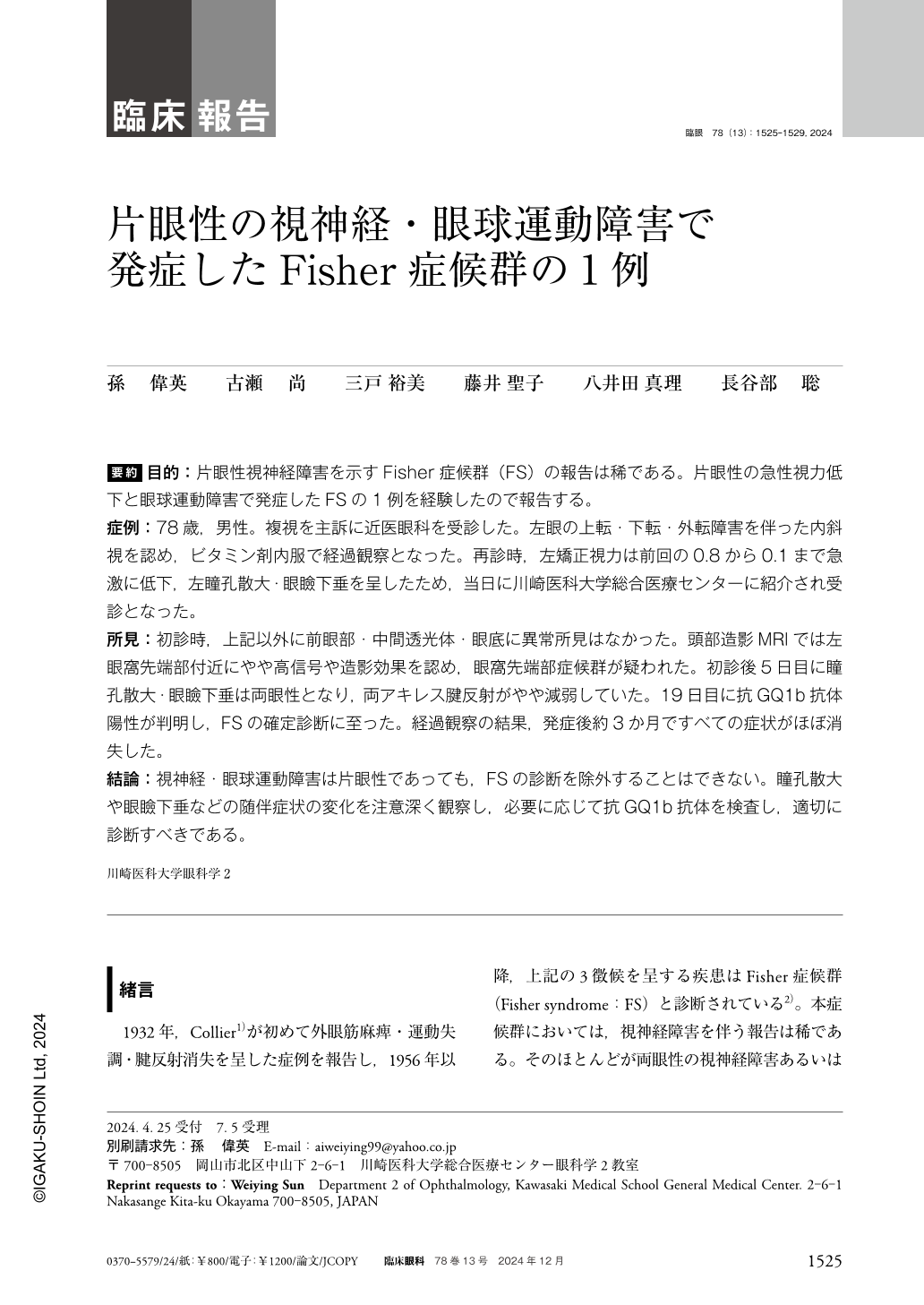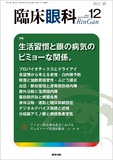Japanese
English
- 有料閲覧
- Abstract 文献概要
- 1ページ目 Look Inside
- 参考文献 Reference
要約 目的:片眼性視神経障害を示すFisher症候群(FS)の報告は稀である。片眼性の急性視力低下と眼球運動障害で発症したFSの1例を経験したので報告する。
症例:78歳,男性。複視を主訴に近医眼科を受診した。左眼の上転・下転・外転障害を伴った内斜視を認め,ビタミン剤内服で経過観察となった。再診時,左矯正視力は前回の0.8から0.1まで急激に低下,左瞳孔散大・眼瞼下垂を呈したため,当日に川崎医科大学総合医療センターに紹介され受診となった。
所見:初診時,上記以外に前眼部・中間透光体・眼底に異常所見はなかった。頭部造影MRIでは左眼窩先端部付近にやや高信号や造影効果を認め,眼窩先端部症候群が疑われた。初診後5日目に瞳孔散大・眼瞼下垂は両眼性となり,両アキレス腱反射がやや減弱していた。19日目に抗GQ1b抗体陽性が判明し,FSの確定診断に至った。経過観察の結果,発症後約3か月ですべての症状がほぼ消失した。
結論:視神経・眼球運動障害は片眼性であっても,FSの診断を除外することはできない。瞳孔散大や眼瞼下垂などの随伴症状の変化を注意深く観察し,必要に応じて抗GQ1b抗体を検査し,適切に診断すべきである。
Abstract Purpose:Few case reports exist of optic nerve involvement in Fisher syndrome(FS). We describe a case of patient who presented with unilateral acute vision loss and eye movement disorder, but was diagnosed with FS.
Case:A 78-year-old man presented with a history of diplopia for 3 weeks. He was initially treated at the eye clinic with a 2-week course of oral vitamin B12 for small esotropia attributed to left eye movement disorders. However, visual acuity in the left eye suddenly decreased accompanied by pupillary dilation and blepharoptosis, and he was referred to our hospital. On his initial visit, there were no abnormal findings in the anterior and posterior ocular regions, apart from those mentioned above. Contrast-enhanced MRI of the head revealed mild hyperintensity in the left orbital apex, raising strong suspicion of orbital apex syndrome. On the fifth day following the initial visit, the pupillary dilation and blepharoptosis progressed bilaterally, and bilateral Achilles tendon reflexes slightly decreased. Anti-GQ1b antibody was detected on the 19th day, leading to the diagnosis of Fisher syndrome. He exhibited a natural, gradual recovery and symptoms had nearly resolved within approximately 3 months after onset.
Conclusion:Even if optic nerve involvement and eye movement disorders are unilateral, the diagnosis of Fisher syndrome cannot be excluded. Patients should be carefully followed-up for changes in accompanying symptoms such as pupillary dilation and blepharoptosis. Anti-GQ1b antibodies are helpful in making an appropriate diagnosis.

Copyright © 2024, Igaku-Shoin Ltd. All rights reserved.


